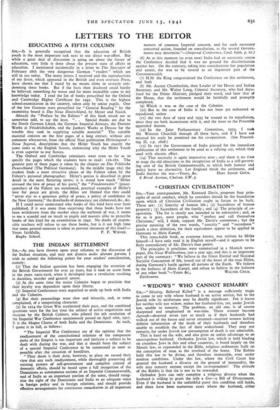THE INDIAN SETTLEMENT
SIR,—As you have thrown open your columns to the discussion of the Indian situation, and may not dismiss audio alteram partem, I wish to submit the following points for your readers' consideration, namely:
(t) That the Indian question has been engaging the attention of the British Government for over 25 years, but it took an acute form in the years 1900-1916, when it developed into a revolution resulting in dacoities, murder and general unrest.
(2) At the same time the major Colonies began to proclaim that their loyalty was dependent upon their liberty.
(3) Imperial Conferences were organised to settle up both with India and the Colonies.
(4) But their proceedings were slow and leisurely, and, as some complained, of a temporising character.
(5) In 1914 the Great War accelerated their pace, and the combined questions were for the last time the subject of active negotiation and decision by the British Cabinet, who piloted the 9th resolution of the Imperial War Conference unanimously passed on April 16th, 1917. It is the Magna Charta of both India and the Dominions. As such, I quote it in full, as follows: " The Imperial War Conference are of the opinion that the readjustment of the constitutional relations of the component parts of the Empire is too important and intricate a subject to be dealt with during the war, and that it should form the subject of a special Imperial Conference to be summoned as soon as possible after the cessation of hostilities. "They deem it their duty, however, to place on record their view that any such readjustment, while thoroughly preserving all existing powers of self-government and complete control of domestic affairs, should be based upon a full recognition of the Dominions as autonomous nations of an Imperial Commonwealth, and of India as an important portion of the same, should recog- nise the right of the Dominions and India to an adequate voice in foreign policy and in foreign relations, and should provide effective arrangements for continuous consultation in all important
matters of common Imperial concern, and for such necessary concerted action, founded on consultation, as the several Govern- ments may determine."—(Imperial Conference, Cmd. 8566, p. 61.)
(6) As at this moment (as even now) India had an autocratic centre the Conference decided that it was no ground for discrimination against her. On the contrary; taking into consideration her population and extent, she was to be treated as an important part of the Commonwealth.
(7) H.M. the King congratulated the Conference on this settlement, and both (8) Mr. Austen Chamberlain, then Leader of the House and Indian Secretary, and Mr. Walter Long, Colonial Secretary, who had depu- tised for the Prime Minister, pledged their word, and later that of the House, that the settlement would be faithfully and promptly completed, (9) Which it was m the case of the Colonies.
(to) But in the case of India it has not been yet redeemed or repudiated, unless i) the two Acts of 1919 and 1935 be treated as its repudiation, since they are both inconsistent with it, and the more so the Preamble appended thereto.
(12) In the Joint Parliamentary Committee, 1933, I took Mr Winston Churchill through all these facts, and if I have not misread his reply he promised me his co-operation. (See Proceed- ing II, c.p. 1828.) (13) In 1917 the Government of India pressed for the immediate publication of this settlement to be used as a rallying cry, which they used with electric effect.
(14) That necessity is again imperative now ; and there is no time to stage the old objections to the recognition of India as a self-govern- ing unit of the British Commonwealth, to which both honour and policy leave no alternative. Let England finish the settlement, and


























 Previous page
Previous page